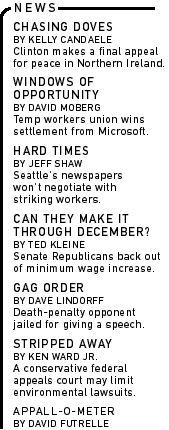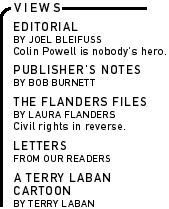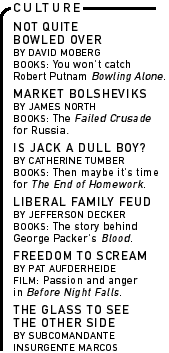 
|

|

|

|
| |
|
|
|
Before Night Falls The gay Cuban writer Reinaldo Arenas was a kind of open wound of left politics in the '80s. As a censored author in a communist dictatorship, he was walking proof of a God that failed, though the anti-communists, neocons and anti-Castro Cubans who heralded his cause also often found his sexually charged art somewhat alarming. As a victim of anti-homosexual persecution in a puritanical regime, Arenas was an icon for the rising movement of gay and lesbian identity politics, as much for his performance of his sexuality as for his art. When it became evident he was dying of AIDS, he also became a symbol of gay demands for more social resources directed to the disease. As an outspoken organizer of anti-Castro activities, he won the scorn of New Leftists who believed that the post-Mariel Cuban government had learned a lesson from its ugly history and that gay activists like Arenas were being exploited by right-wingers. Variously hailed and denounced for reasons that intersected with but did not capture his passions, Arenas continued furiously to compose poetry and novels. In an expiring act of vitality, he completed his memoirs--and then, in impoverished exile in New York, took his own life at the age of 37 in 1990. Now another high-profile artist has told Arenas' life story, in Before Night Falls, a film which borrows its title from the author's memoir. Director Julian Schnabel is a celebrity artist, an artist of celebrity even. He launched
In Before Night Falls, technically a far more ambitious project than Basquiat, Schnabel showcases for broader audiences his uncanny combination of charm, corn, exuberance and sentiment. The movie works terrifically. It features a central performance by Spanish superstar Javier Bardem who fully deserves his multiple awards (notably at the Venice Film Festival). It tells a compelling, tightly paced tale. It's full of small visual wonders and laced with delicious celebrity cameos (Johnny Depp both as a transvestite prisoner and as the prison guard; Sean Penn as a cranky peasant), as well as a nice turn for the director's liquidly handsome young son as the youthful Arenas. The film stays on the safe side of every political controversy. To Cuban-Americans mobilized to pounce on the film for being soft on dictatorship, Schnabel has simply put Castro on screen, in documentary footage that indicts him out of his own mouth. For gays and lesbians, this is a richly drawn portrait of someone whose sexuality was an essential aspect of his public art and the passion for freedom that infused every part of his art. And Schnabel has not slighted Arenas' criticism of his refuge in exile. He features a quip Arenas developed in his first encounters with the U.S. press: "The difference between the communist and capitalist systems is that, although both give you a kick in the ass, in the communist system you have to applaud, while in the capitalist system you can scream."
|


